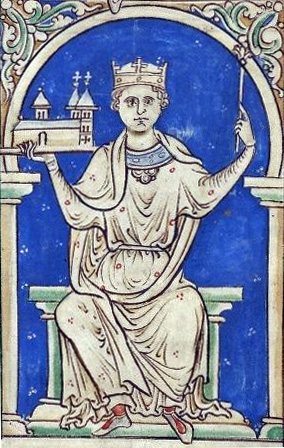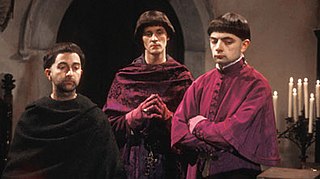
Stephen, often referred to as Stephen of Blois, was King of England from 22 December 1135 to his death in 1154. He was Count of Boulogne jure uxoris from 1125 until 1147 and Duke of Normandy from 1135 until 1144. His reign was marked by the Anarchy, a civil war with his cousin and rival, the Empress Matilda, whose son, Henry II, succeeded Stephen as the first of the Angevin kings of England.

Sir Henry Percy, nicknamed Hotspur or Harry Hotspur, was an English knight who fought in several campaigns against the Scots in the northern border and against the French during the Hundred Years' War. The nickname "Hotspur" was given to him by the Scots as a tribute to his speed in advance and readiness to attack. The heir to a leading noble family in northern England, Hotspur was one of the earliest and prime movers behind the deposition of King Richard II in favour of Henry Bolingbroke in 1399. He later fell out with the new regime and rebelled, and was slain at the Battle of Shrewsbury in 1403 at the height of his fame.

Richard of York, 3rd Duke of York, also named Richard Plantagenet, was a leading English magnate and claimant to the throne during the Wars of the Roses. He was a member of the ruling House of Plantagenet by virtue of being a direct male-line descendant of Edmund of Langley, King Edward III's fourth surviving son. However, it was through his mother, Anne Mortimer, a descendant of Edward III's second surviving son, Lionel of Antwerp, that Richard inherited his strongest claim to the throne, as the opposing House of Lancaster was descended from John of Gaunt, Duke of Lancaster, the third surviving son of Edward III. He also inherited vast estates and served in various offices of state in Ireland, France and England, a country he ultimately governed as Lord Protector due to the mental instability of King Henry VI.

Joan, Countess of Kent, known as the Fair Maid of Kent, was the mother of King Richard II of England, her son by her third husband, Edward the Black Prince, son and heir apparent of King Edward III. Although the French chronicler Jean Froissart called her "the most beautiful woman in all the realm of England, and the most loving", the appellation "Fair Maid of Kent" does not appear to be contemporary. Joan inherited the titles 4th Countess of Kent and 5th Baroness Wake of Liddell after the death of her brother John, 3rd Earl of Kent, in 1352. Joan was made a Lady of the Garter in 1378.

The Anarchy was a civil war in England and Normandy between 1138 and 1153, which resulted in a widespread breakdown in law and order. The conflict was a war of succession precipitated by the accidental death of William Adelin who drowned in the White Ship disaster of 1120. Henry sought to be succeeded by his daughter, known as Empress Matilda, but was only partially successful in convincing the nobility to support her. On Henry's death in 1135, his nephew Stephen of Blois seized the throne, with the help of Stephen's brother Henry of Blois, who was the bishop of Winchester. Stephen's early reign saw fierce fighting with disloyal English barons, rebellious Welsh leaders, and Scottish invaders. Following a major rebellion in the south-west of England, Matilda invaded in 1139 with the help of her half-brother Robert of Gloucester.

Sam Youd was a British writer best known for science fiction written under the name of John Christopher, including the novels The Death of Grass, The Possessors, and the young-adult novel series The Tripods. He won the Guardian Children's Fiction Prize in 1971 and the Deutscher Jugendliteraturpreis in 1976.

Lionel of Antwerp, Duke of Clarence,, was an English prince, Earl of Ulster jure uxoris from 1347, Duke of Clarence from 1362, Guardian of England in 1345-1346, Lord Lieutenant of Ireland in 1361-1366, Knight of the Garter from 1361, second surviving son of King Edward III of England and Philippa of Hainault. He was named after his birthplace, at Antwerp in the Duchy of Brabant.

Edmund of Langley, 1st Duke of York was the fourth surviving son of King Edward III of England and Philippa of Hainault. Like many medieval English princes, Edmund gained his nickname from his birthplace: Kings Langley Palace in Hertfordshire. He was the founder of the House of York, but it was through the marriage of his younger son, Richard of Conisburgh, 3rd Earl of Cambridge, to Anne de Mortimer, great-granddaughter of Edmund's elder brother Lionel of Antwerp, 1st Duke of Clarence, that the House of York made its claim to the English throne in the Wars of the Roses. The other party in the Wars of the Roses, the incumbent House of Lancaster, was formed from descendants of Edmund's elder brother John of Gaunt, 1st Duke of Lancaster, Edward III's third son.
Edmund, 1st Earl of Lancaster, also known as Edmund Crouchback, was a member of the royal Plantagenet Dynasty and the founder of the first House of Lancaster. He was Earl of Leicester (1265–1296), Lancaster (1267–1296) and Derby (1269–1296) in England and Count Palatine of Champagne (1276–1284) in France.

Peter Pevensie is a fictional character in C. S. Lewis's The Chronicles of Narnia book series. Peter appears in three of the seven books; as a child and a principal character in The Lion, the Witch and the Wardrobe and Prince Caspian, and as an adult in The Last Battle. He is mentioned in The Horse and His Boy, in which he is away on the northern frontier fighting giants, and in The Voyage of the Dawn Treader, in which he is studying under the tutelage of Professor Kirke.

Edmund Pevensie is a fictional character in C. S. Lewis's The Chronicles of Narnia series. He is a principal character in three of the seven books, and a lesser character in two others.

The Principality of Wales was originally the territory of the native Welsh princes of the House of Aberffraw from 1216 to 1283, encompassing two-thirds of modern Wales during its height of 1267–1277. Following the conquest of Wales by Edward I of England of 1277 to 1283, those parts of Wales retained under the direct control of the English crown, principally in the north and west of the country, were re-constituted as a new Principality of Wales and ruled either by the monarch or the monarch's heir though not formally incorporated into the Kingdom of England. This was ultimately accomplished with the Laws in Wales Acts 1535–1542 when the Principality ceased to exist as a separate entity.

The Battle of Lincoln, or the First Battle of Lincoln, occurred on 2 February 1141 in Lincoln, England between King Stephen of England and forces loyal to Empress Matilda. Stephen was captured during the battle, imprisoned, and effectively deposed while Matilda ruled for a short time.

The Castilian Civil War was a war of succession over the Crown of Castile that lasted from 1351 to 1369. The conflict started after the death of king Alfonso XI of Castile in March 1350. It became part of the larger conflict then raging between the Kingdom of England and the Kingdom of France: the Hundred Years' War. It was fought primarily in Castile and its coastal waters between the local and allied forces of the reigning king, Peter, and his illegitimate brother Henry of Trastámara over the right to the crown.

"Born to Be King" is the second episode of The Black Adder, the first series of the BBC sitcom Blackadder. Set in late 15th-century England, the episode takes a humorous look at rivalries with the Kingdom of Scotland and centres the dramatic tension on the doubts cast over parentage of the lead character, Prince Edmund, Duke of Edinburgh.

"The Archbishop" is the third episode of the first series of the BBC sitcom Blackadder. It is set in England in the late 15th century, and follows the exploits of the fictitious Prince Edmund as he is invested as Archbishop of Canterbury amid a Machiavellian plot by the King to acquire lands from the Catholic Church. Most of the humour in the episode relies on religious satire.
This is a bibliography of the works of Michael Moorcock.

Blodwen is an opera in three acts composed in 1878 by Dr Joseph Parry to a libretto by Richard Davies. It was the first opera written in the Welsh language.
The Ínclita Geração is a term commonly used by Portuguese historians to refer to a group of 15th-century infantes (princes) of the House of Aviz, specifically the sons of King John I of Portugal and his wife Philippa of Lancaster : the future king Edward of Portugal; the future regent Peter of Coimbra; Prince Henry the Navigator; the constable John of Reguengos; and the martyr Ferdinand the Holy Prince.

In the autumn of 1016, the Danish prince Cnut the Great (Canute) successfully invaded England. Cnut's father, Sweyn Forkbeard, had previously conquered and briefly ruled England for less than five weeks.


















